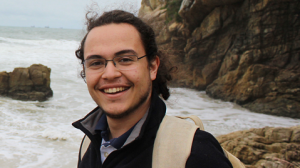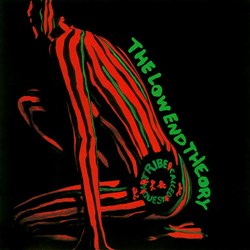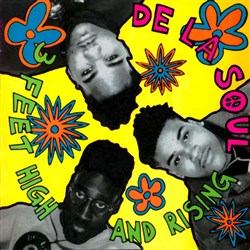
BY ALTUĞ KARAKURT (EE/III)
altug.karakurt@ug.bilkent.edu.tr
A considerable number of recent successful hip-hop releases contain traces of ’80s and ’90s style, and I think this is a consistent trend that might have been expected to occur. As mentioned in an album review by hip-hop music reviewers DeadEndHipHop, the genre now has a history of more than 30 years and is mature enough to revisit old ideas and reinterpret them in a new way. Hip-hop has been very progressive in terms of spawning innovative styles and trends, but during the last few years old-school hip-hop has been revived by young artists. Since most current fans of the genre hadn’t yet been born during this era, and in the new releases, old-school influences coexist with modern touches, the comeback of ’80s and ’90s sounds brings a lot of creativity to the table. The most notable releases to reflect this trend would be “1999” by Joey Bada$$ (2011), “BBNG” and “BBNG2” by BADBADNOTGOOD (2011 and 2012), “Piñata” by Freddie Gibbs (2014) and “To Pimp a Butterfly” by Kendrick Lamar (2015); but there are many more examples.
One of the most influential movements in this respect would be the jazz rap era of the late ’80s and early ’90s. This sub-genre is known for employing many elements characteristic of jazz, with its thick basslines and groovy drum tracks, along with conscious, clever lyrics with lots of references. Jazz rap collectives defined the lyrical approach of the socially aware hip-hop that came after them and also paved the way for the boom-bap and ’90s gangsta hip-hop production style. This week, I will introduce my favorite albums from two leading figures of this movement, A Tribe Called Quest (ATCQ) and De La Soul. I think the greatest virtue of both bands is their ability to balance the content of their lyrics. Their releases cover very diverse topics—from the everyday experiences of their members to socially aware, political messages to entertaining, humorous tracks that barely have a topic—and yet still manage to stay on point and be consistent by sticking to certain concepts and themes. I think this balance is what makes the difference between such releases and mere propaganda albums.
A Tribe Called Quest – The Low End Theory
 ATCQ is a hip-hop group from Brooklyn, New York, formed in 1985. They have received the most praise for their conceptual release “Midnight Marauders,” but I find their sophomore album, “The Low End Theory,” to be the defining masterpiece in their career.
ATCQ is a hip-hop group from Brooklyn, New York, formed in 1985. They have received the most praise for their conceptual release “Midnight Marauders,” but I find their sophomore album, “The Low End Theory,” to be the defining masterpiece in their career.
After their experimental and quite peculiar debut, “People’s Instinctive Travels and Paths of Rhythm,” this was the album in which they perfected their unique sound and pretty much drew the blueprint for late ’90s boom-bap productions. The track “Excursions” starts the album off with an organic bass loop and occasional brass sections, accompanied by Q-Tip’s smooth flow. I can’t think of a way to better describe the sound on this album than Q-Tip does in his second verse on this track: “… listen to the knowledge being dropped over beats/Beats that hard beats that are funky/They could get you hooked like a crack head junkie/What you gotta know is Tribe is in the sphere/The Abstract poet prominent like Shakespeare.”
“The Low End Theory” is a great example of the balance that I mentioned above. For example, the opening track doesn’t follow any story or theme, but simply talks about the band and their ideas on random topics, while “Butter” and “Show Business” are dedicated to a severe critique of the state of music and the entertainment industry, as well as how the relationships in this milieu are fake and superficial. On the same album, the lyrics of “What?” are a series of rhetorical questions with references to popular culture and political issues.
De La Soul – 3 Feet High and Rising
De La Soul is a hip-hop trio from Long Island, New York, and this is their debut album, released in 1989. This record is credited with being a milestone in hip-hop history, as it was the first release that managed to combine humor and lyrical depth, along with the definitive jazz rap sound.
“3 Feet High and Rising” starts off with a peculiar skit, where four contestants are introduced in a quiz show and given four ridiculous questions to answer. The album doesn’t follow this theme very closely, but these characters do appear throughout it in skits between the tracks. This release is another example of balanced content. There are many lyrics that don’t really make sense, but rather are  mockeries or a series of silly jokes. However, there are also very conscious moments in the album, such as “Ghetto Thang,” in which De La Soul talks about the poverty of the African-American community, and “Say No Go,” which is an anti-drug song. These interludes feel like moments of awakening in this journey of over an hour along these MCs’ crazy trains of thoughts.
mockeries or a series of silly jokes. However, there are also very conscious moments in the album, such as “Ghetto Thang,” in which De La Soul talks about the poverty of the African-American community, and “Say No Go,” which is an anti-drug song. These interludes feel like moments of awakening in this journey of over an hour along these MCs’ crazy trains of thoughts.
Considering the serious atmosphere of the hip-hop scene and the level of competition, De La Soul’s attitude in this album might seem foolish to a new listener, but as was said of Hamlet, there’s a method to their madness. Give this record a listen for one of the weirdest and most entertaining musical experiences ever.
